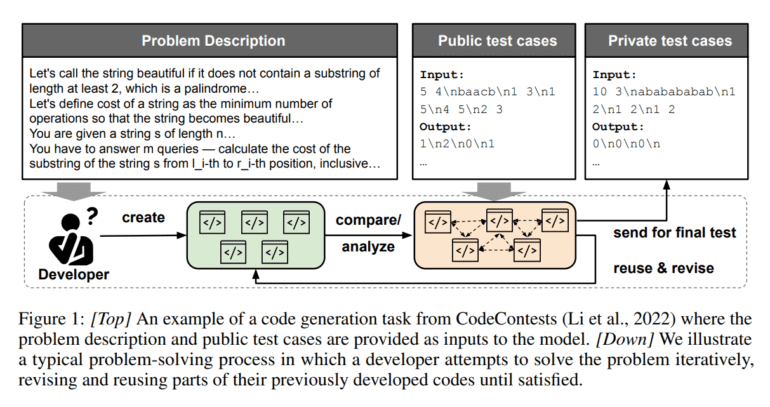TL;DR:
- Salesforce AI introduces CodeChain, a groundbreaking framework.
- CodeChain bridges the gap between LLMs and human developers.
- It encourages logical subtask-oriented code generation.
- The framework involves two phases: Sub-Module Extraction and Prompt Augmentation.
- CodeChain significantly enhances modularity and accuracy in code generation.
- Relative pass@1 improvements of 35% in APPS and 76% in CodeContests are observed.
- Comprehensive studies reveal the success factors of CodeChain.
- CodeChain is set to revolutionize AI-powered code generation.
Main AI News:
Artificial Intelligence (AI) has long been a focal point of research, with a primary goal being the creation of AI systems that can craft practical computer programs to tackle complex challenges. Recent strides in the field, particularly the monumental achievements of pretrained Large Language Models (LLMs), have propelled us toward this aspiration. Originally designed for natural language comprehension, LLMs have now evolved to excel in code and text generation, marking a significant milestone in AI development.
These LLMs have successfully demonstrated their prowess in handling routine programming tasks, showcasing their capabilities in benchmark tests like MBPP and HumanEval. Nevertheless, when faced with intricate and competitive programming challenges, they often stumble. Their tendency to deliver code solutions as monolithic entities, rather than breaking them down into logical subtasks and reusable sub-modules, has been a major stumbling block.
In stark contrast, human programmers instinctively craft modular and abstract code when confronted with complex problems. They tap into their repertoire of pre-existing modules, effectively expanding their current knowledge base.
In a recent breakthrough, Salesforce Research has introduced CodeChain, a cutting-edge framework designed to bridge the gap between LLMs and human developers. Leveraging a sequence of self-revisions driven by representative sub-modules developed in earlier iterations, CodeChain seeks to streamline the process of generating modularized code. The essence of CodeChain lies in encouraging LLMs to approach problem-solving from the perspective of logical subtasks and reusable sub-modules.
The CodeChain framework is built on a sequence of self-revisions, comprising two iterative phases:
- Sub-Module Extraction and Clustering: This initial phase involves the identification of sub-modules by analyzing the code generated by LLMs. Subsequently, these sub-modules are organized into clusters, with representative sub-modules selected from each cluster. These representatives are considered more universally applicable and reusable.
- Prompt Augmentation and Re-Generation: The second phase entails enhancing and regenerating the original chain-of-thought prompt by incorporating the chosen module implementations from the previous stage. LLMs are then tasked with generating fresh modularized solutions once again, thereby building on the knowledge and insights acquired from previous iterations.
The impact of CodeChain on code generation is nothing short of remarkable. The research team has reported substantial improvements in both modularity and accuracy of generated solutions, achieved by encouraging LLMs to build upon and reuse pre-existing, verified sub-modules. Notably, CodeChain has led to relative pass@1 improvements of 35% in APPS and an astonishing 76% in CodeContests. These gains are evident across various LLMs, including open-source options like WizardCoder and models from OpenAI.
Comprehensive ablation studies have been conducted to delve deeper into the factors contributing to CodeChain’s success. These investigations have explored aspects such as prompting techniques, cluster quantities, LLM model sizes, and program quality. The insights gained from these studies shed light on why CodeChain excels in elevating the caliber and modularity of code produced by LLMs, making it a game-changer in the world of AI-powered code generation.
Conclusion:
CodeChain’s introduction by Salesforce AI marks a pivotal moment in AI-powered code generation. Its ability to boost modularity and accuracy, along with substantial improvements in pass rates, signifies a significant leap forward. This innovative framework is poised to reshape the landscape of code generation, offering businesses more efficient and reliable solutions.

